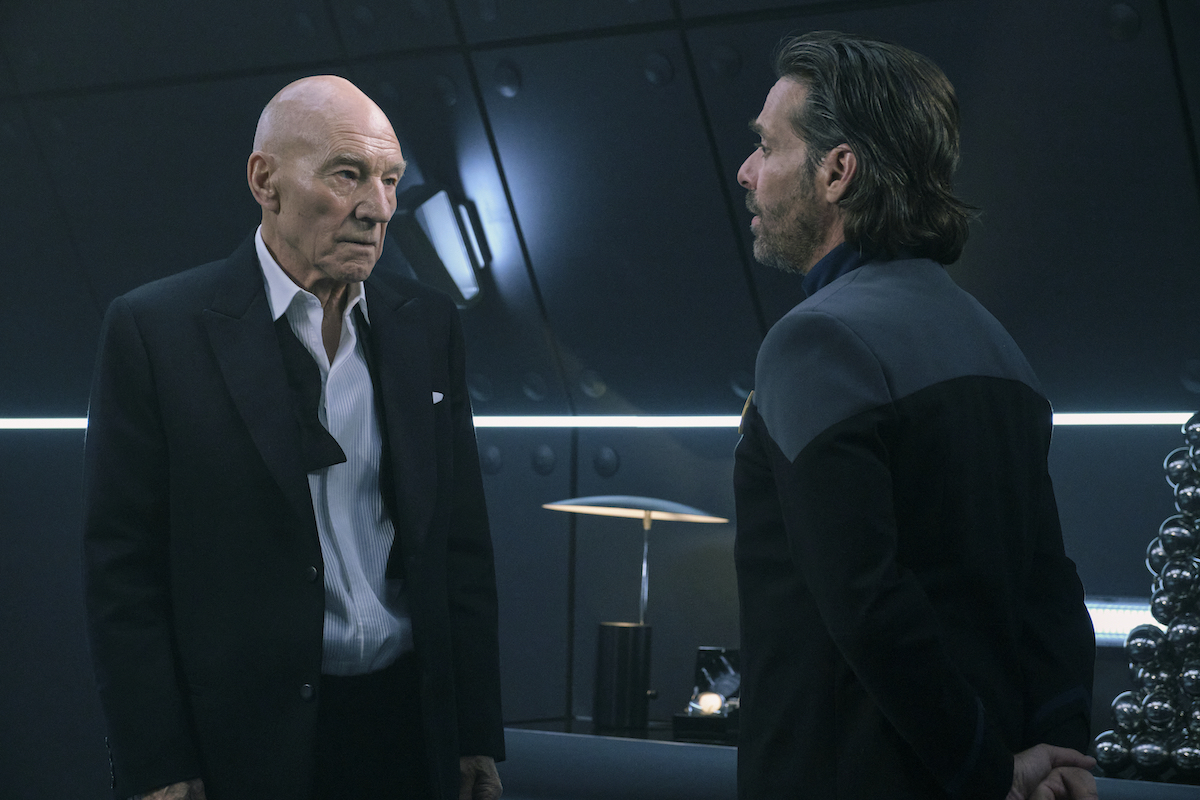This entry was written during the 2023 WGA and SAG-AFTRA strikes. Without the labor of the writers and actors currently on strike, this television series wouldn’t exist. To learn more, visit the WGA strike hub and the SAG-AFTRA strike site.
“I bet five-drink Picard is a blast.”
We meet Yvette Picard, Jean-Luc’s aged mother, once during the original run of Star Trek: The Next Generation. The encounter is not real — we “meet” her in a quasi-fantasy alternate reality at the boundary of space and time in “Where No One Has Gone Before,” and she’s as much a figment of Picard’s imagination as a real person — but she leaves an impression. Actually, what leaves more of an impression is Picard’s warmth, and immediate softening, in her presence; only the fourth episode of Next Gen, “Where No One” may well have been the first time Jean-Luc dropped his imperious authority and (as witnessed only by us, the viewers) became a human being. Once Riker comes around the corner, the illusion of Yvette Picard vanishes and the reality of Jean-Luc Picard coalesces. He pulls his crew — through charismatic, principled leadership — back to their galaxy and their regular lives, as he would continue to do for some 175 further adventures.
I don’t think there’s been a proper accounting for what we lost when Picard became whatever he is on the series that bears his name. I’ve sketched around the edges of this wholesale transformation as best I can on this series of BTNG:P, but it sort of comes down to a distressingly singular point: this is not the guy. As big a fan of The Last Jedi as I am, I am particularly sensitive to what a declaration of “not my Picard” means in this context; but, I also do not think the Picard of Star Trek: Picard is an evolution of the character that Patrick Stewart played capably for seven years on Next Generation, so much as a wholesale rejection of him. This is a hostile takeover, a thoughtful man laid low by an actor and a creative team whose prevailing interest, for want of a better term, seems to have been to make Picard seem cool — and not just 24th Century cool. The Picard of Picard is a denim-wearing L.A. hipster zaddy of the Twitter Trump 2010s; and gods, he’s a bore.
The Picard I grew up with was aspirational. He was a scientist and an explorer. As Tasha once said, he had the soul of a poet, which came out in fiery Shakespearean pull-quotes and the handful of moments where the momentum of the Enterprise‘s great adventures seemed to catch up with him, and he could only turn to art (or opera) to understand himself. He professed himself inept at emotionality (and, particularly, at dealing with children), and so, naturally proved to be exceptional at both, leading the crew of the 1701-D not just on missions, but in the development of their emotional lives. He was, and remains, the best captain that has been portrayed on Star Trek (so far), and he shaped me — as a viewer between the onset of puberty and my graduation from high school — in ways I unpacked for the next twenty or thirty years.
I miss him, and as of “Monsters,” I pretty much hate the monster that Star Trek: Picard has reared in his place.
Season one of this series was a lunkheaded attempt to update Picard for the Peak TV era, but I ultimately gave it a pass based on a handful of good, or at least interesting, episodes. Season two of Picard is so fucking awful, and so openly belligerent towards the legacy of both Picard as a character and Star Trek as a premise, that it feels like televised trolling. “Monsters,” in addition to the continued, series-long assassination of Picard as a character, also offers up one (of several) of Picard‘s absolutely spiteful takes on mental health, configuring Yvette as the Madwoman of Chateau Picard, as though the people of the 24th Century would have regressed backwards, empathy-wise, into the tropes one finds in a Victorian Gothic novel.
It infuriates me, but only because it’s so intentionally, violently hurtful — towards people like me; towards people (like me) who cared about Next Gen or ever took it seriously; and hey, while we’re here, towards anyone with half a mind, who wants to watch good television. Picard season two is, quite simply, one of the worst seasons of television ever to exist. Entries shall be short from here out.
Blogging the Next Generation: Picard runs Thursdays on tederick.com as I work my way through every episode of Star Trek: Picard. The original BTNG did the same for Star Trek: The Next Generation.
